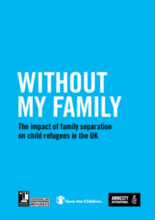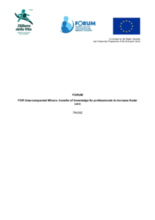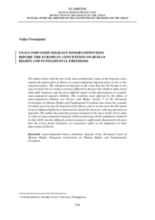Displaying 361 - 370 of 824
The report highlights how children’s movement is driven by different motivations, exposes children to different forms of harm, and presents multiple barriers to accessing services.
The National Child Traumatic Network (NCTN) has published a list of measures that front line professionals can use to assess the exposure to trauma among migrant and refugee families and children.
This dissertation examines the communication between left-behind children in China and their migrant parents from the three-level perspective of relational maintenance (Dainton, 2003): the self, the system, and the network contexts.
This chapter describes and proposes a new social inclusion model for supporting unaccompanied minors in becoming autonomous, as they are one of the most vulnerable groups of contemporary migration flows.
This study explores conceptions of the notion of unaccompanied minors (UM) in Senegal and analyzes the resources and coping mechanisms of these minors when confronted with migratory traumas.
In this report, Amnesty International UK, the Refugee Council and Save the Children expose how the UK Government’s policy on refugee family reunion is damaging the lives of children in the UK, and how its justifications for the policy are unsubstantiated.
This paper presents a juvenile delinquency prevention program for unaccompanied foreign minors in street situations in Ceuta, Spain. The main objective is to assess the implementation and results of this program.
Data and Trend Analysis (DATA) Refugees and Migrants at the Western Balkans Route Regional Overview, covering period July - September 2019, describes key trends in migrations in the region, detailing information about the number of people on the move, demography (age, sex, country of origin, etc), behavioral patterns, and routes in use - with a focus on children, particularly unaccompanied children.
This article is written as part of the FORUM project (FOR Unaccompanied Minors: transfer of knowledge for professionals to increase foster care), an EU funded project which sought to enhance the capacity of professionals to provide quality foster care for unaccompanied migrant children, primarily through the transfer of knowledge. The article aims to contribute to this transfer of knowledge by bringing together literature which is of relevance to professionals developing or enhancing foster care services for unaccompanied migrant children.
In this article, the author deals with one of the most problematic issues of the migrant crisis, namely the deprivation of liberty of a unaccompanied migrant minor in his or her migrant journey.






